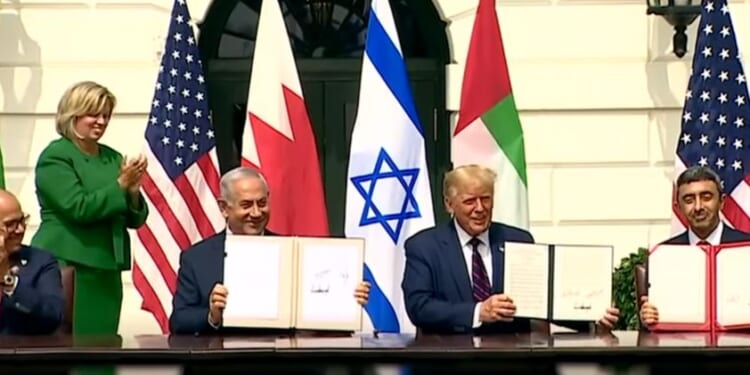Reports of Israel’s global ostracism are greatly exaggerated. Even before the current cease-fire reduced the sound and the fury of the self-appointed international moral elites, the reality — as is usually the case — was much more nuanced.
Israel has indeed aroused tremendous hostility from the “West” — defined here as Western and Northern Europe and the world’s English-speaking countries. Much has been written already about the alarming attitudes of its younger generation towards Israel. While this raises deep concerns about the durability and longevity of Israel’s traditional alliances, it must be seen in the context of the profound internal strife in each and every one of these Western countries: precipitously declining birth rates, unchecked and illegal immigration, calamitous loss of public faith in democratic institutions, and national identity crises.
Azerbaijan (another Muslim majority country) has become one of Israel’s closest and most dependable strategic partners.
These countries are facing a domestic battle for their future, and as it pertains to Western and Northern Europe — a civilizational decision point; within the next 30 years their fate as “Western” societies will be determined.
For all intents and purposes, Israel is a bystander to the West’s internal turbulence, and oftentimes a casualty. Understood in this way, sentiment on Israel is more a reflection of the West’s ongoing demoralization than a referendum on Israel’s moral standing. And so, for reasons independent of Israel’s conduct, it’s entirely conceivable that many in the West will cease to be allies of Israel. Be that as it may, Israel should continue to strengthen relations and cultivate alliances with domestic blocs in these countries that seek to retain a strong sense of national identity and adherence to traditional cultural values.
At the same time, it’s only prudent that Israel begins preparing for a seismic reorientation, not because of the West’s hysterical outrage and performative sanctions for its prosecution of the Gaza War, but because the West as we’ve known it may be irrevocably changing. Refraining from such an urgent audit would be simply irresponsible.
Turning eastward we see a completely different story. Many of the countries that comprise Central and Eastern Europe have maintained strong relations during the Gaza War: Slovakia, Bulgaria, Hungary, Serbia, the Czech Republic, Romania, Albania (a predominantly Muslim country), and the Baltic states (Latvia, Estonia, Lithuania). Some of the aforementioned have even bolstered relations. While they may not be economic powerhouses, their economies are growing at a faster rate on average than Western Europe, and they do not face the internal identity crisis that mass immigration has brought to Western Europe. To this extensive list can be added Greece, Cyprus, and Austria, other European countries that have also expanded ties over the past two years.
In Central Asia — which has assumed a pivotal role in global politics due to its vast resource wealth and geographic centrality — Azerbaijan (another Muslim majority country) has become one of Israel’s closest and most dependable strategic partners and a staunch ally during the Gaza war, while Kazakhstan has maintained constructive relations with Israel throughout.
The Indo-Pacific is another region where bilateral relations are quietly flourishing. India — the most populous democracy on the planet and a burgeoning superpower, continues to cultivate its special relationship with Israel and is one of its stalwart partners. Meanwhile, relations with Singapore, Japan, South Korea, Vietnam, and Thailand have not suffered as a result of the Gaza War, but rather remain solid and continue apace.
Even in the Arab world, the Abraham Accords — for all the noise and fuss — remained rock solid, and according to an in-depth report by the Washington Post, its members and other Gulf states even intensified cooperation during the Gaza War.
Should the Abraham Accords be expanded, as expected with the tenuous conclusion of the Gaza War and the upcoming visit to the White House by Saudi Arabia’s ruler Mohammad Bin Salman, one can begin to glimpse what Israel’s alliance architecture and reoriented geopolitical position may look like. It could be termed the “Rimland strategy.”
The Rimland Theory holds that global power and influence lie in its densely populated, resource-rich coastal periphery. Stretching from Europe through the Middle East and South Asia to East Asia, the Rimland is where maritime and continental powers meet, trade converges, and conflicts are decided. While conceived in the mid-twentieth century, the concept remains instructive today: small but strategically situated states can exert disproportionate influence by anchoring the networks of commerce, security, and culture that traverse this vital geopolitical corridor.
Indeed, Israel is a small state that will bear this seminal characteristic and face its consequent dilemmas in perpetuity. It cannot wage conquest nor thrive in autarkic isolation. What it can do is utilize its competitive advantages — human capital and geographic centrality — to entrench itself as a cornerstone in a transformed regional order.
Israel’s geography has historically ensconced it as a crossroad sitting astride intercontinental trade routes, notwithstanding its lack of natural resources. However, this lack can be more than compensated for in commercial indispensability via its strategic geography. Squarely situated on the land bridge between Europe, Asia, and Africa, and controlling access to two seas (the Mediterranean to its west and the Red Sea to its south, with gateways onward to the Atlantic and Indian Oceans), Israel occupies one of the world’s most important transit locations.
This geographic position endows Israel with new opportunities in an era of reconfiguring trade routes. Roughly 10 percent of international trade flows through the nearby Suez Canal. Israel’s economic capacity — which far exceeds that of its neighbors — coupled with a vibrant democratic system that is a conspicuous exception in the Middle East, positions it as a politically stable and economically advanced outlier in a region marked by volatility. Israel thus offers a stable, economically efficient overland alternative between the Mediterranean and the Red Sea.
In fact, the recently proposed India — Middle East–Europe Economic Corridor (IMEC) — announced at the G20 Summit in September 2023 — envisions exactly such a route, one that would bypass traditional chokepoints like Suez and provide a strategic counterpoint to China’s Belt and Road Initiative. In this vision, Israel would serve as a central terminal in a new chain of commerce connecting South Asia with Europe. The mere possibility of IMEC underscores how Israel’s geography, if leveraged, could reposition it as a vital land bridge in the international trading system. The IMEC appears to be an inspired translation of the Rimland Theory into practice, with Israel literally smack in the middle.
To make such an ambitious global goal possible, Israel must do its part. It must continue to cultivate a latticework of partnerships with the diverse array of states mentioned above rather than relying on any single patron. It should aim to build an alliance network built not on formal mutual-defense treaties (which is understandably daunting for Israel’s allies) but on structured interdependence — the concept that nations become so economically and militarily entwined that their interests naturally align. Allies in such a confederation share not only common interests but — more importantly — common, intrinsic challenges that dictate their geostrategic orientation and entrench the affiliation in a deep-seated and durable bond.
Potential partners to such an alliance include: Greece and Cyprus, which share Eastern Mediterranean energy and security concern; Azerbaijan, a vital link in the emerging Eurasian corridor; India, which is already Israel’s single largest arms customer, and faces similar internal ethnic tensions and disputed territories with its neighbors; and Singapore, South Korea, and Japan, states that share Israel’s profile as high-tech economies in regions where threats loom large. Practical steps could include joint R&D funds, integrated supply lines for critical industries, shared early-warning systems, and coordinated maritime patrols.
This type of alliance is the definition of synergy — enabling each nation to optimize its strengths within a framework that multiplies collective benefit. Through such an alliance, Israel would play an integral role in a transformative joint initiative of monumental scale.
In order for this Rimland alliance to actuate, Israel will require a more marked integration into its regional order, to the extent that volatility is minimized and investor confidence increased. The potential Abraham Accords expansion presents such an opportunity. Formal relations with Saudi Arabia and other states in the Gulf, as well as additional Muslim states in the Indo-Pacific region, would lengthen Israel’s economic corridor and at the same time solidify its place as a cornerstone in a region it has already transformed.
There are, of course, other significant challenges. Israel is the target of enmity for tens of millions in the region it inhabits, where religiously-inspired animosity often overwhelms economic promise. It is contending with a fragmented, unpredictable and developing order — jockeying among an ambivalent United States, an ascendant China, a vengeful Iran, an opportunistic Turkey, and regional actors with shifting loyalties. But regional aggression and international volatility is the reality within which Israel has existed since its inception, and Israel is in an unprecedented position economically, militarily, and diplomatically, permitting it to consider such a drastic policy shift.
While it is certainly distressing to experience a rift with and suffer rejection by long-standing allies, there is little time in international affairs for sentimentality. Israel must adapt, and at the very least generate contingency plans — with regions and countries that are not only more receptive but actively engaging. Diversification of relations and the construction of robust new alliances not only safeguards Israel from “global” ostracism, but also offer it a path to greater independence and security.
READ MORE:
Post-Identity Antisemitism: The New Obsession With Israel

















